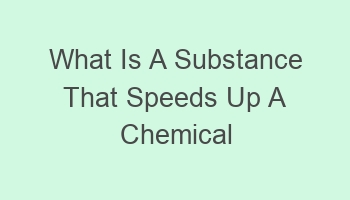What Is A Substance That Speeds Up A Chemical Reaction?

A substance that speeds up a chemical reaction is known as a catalyst. Catalysts are crucial in increasing the rate of reactions without being consumed in the process. These substances work by lowering the activation energy required for a reaction to occur, making it happen more quickly. Chemical reactions can be accelerated by catalysts in various industries, from pharmaceuticals to energy production. Understanding how catalysts function is essential in optimizing processes for efficiency and cost-effectiveness. By facilitating reactions, catalysts play a vital role in driving progress and innovation in numerous fields. Their ability to accelerate reactions has a profound impact on the way we develop products and technologies.
Contents
| Substances that speed up chemical reactions are called catalysts. |
| Catalysts lower the activation energy needed for a reaction to occur. |
| Enzymes are biological catalysts that speed up reactions in living organisms. |
| Catalysts remain unchanged after a reaction and can be used repeatedly. |
| Common catalysts include metals like platinum, palladium, and nickel. |
- Catalysts provide an alternative reaction pathway with lower energy.
- They can speed up reactions in industrial processes like petroleum refining.
- Catalysts increase the rate of reaction without being consumed.
- They can be used to selectively convert one substance into another.
- Catalysts play a crucial role in green chemistry by reducing waste.
What Is a Catalyst?
A catalyst is a substance that speeds up a chemical reaction by lowering the activation energy required for the reaction to occur. It does not undergo any permanent chemical change itself during the reaction. This means that a catalyst can be used repeatedly in multiple reactions.
- Catalysts can be in the form of solid, liquid, or gas.
- They work by providing an alternative reaction pathway with a lower activation energy.
- Catalysts can increase the rate of reaction without being consumed in the process.
How Do Catalysts Work?
Catalysts work by providing an alternative route for the reaction to occur that requires less energy. This lowers the activation energy barrier, allowing the reaction to happen more quickly. Catalysts achieve this by stabilizing the transition state of the reaction, making it easier for the reactants to convert into products.
| Catalysts can increase reaction rates by a factor of millions or more. |
| They can be specific to certain reactions or work on a broad range of reactions. |
Why Are Catalysts Important in Chemical Reactions?
Catalysts play a crucial role in chemical reactions as they can significantly speed up reactions that would otherwise occur very slowly or not at all. They are essential for various industrial processes, environmental cleanup, and biological functions.
- Catalysts can lower the energy needed for reactions, reducing costs and energy consumption.
- They can improve the selectivity and efficiency of reactions.
- Catalysts enable the production of products that would be difficult to obtain without them.
Can Catalysts Make Reactions Reversible?
Yes, catalysts can make reactions reversible by altering the kinetics of the reaction. They can facilitate both the forward and reverse reactions, allowing the system to reach equilibrium more quickly. This ability to drive reactions in both directions is crucial in many chemical processes.
| Catalysts can promote the conversion of reactants to products and vice versa. |
| They do not change the equilibrium position of a reaction but help reach equilibrium faster. |
Are Enzymes Catalysts in Biological Systems?
Enzymes are biological catalysts that play a vital role in speeding up biochemical reactions in living organisms. They are highly specific, often facilitating reactions that are essential for life processes. Enzymes are crucial for metabolic pathways, digestion, and various cellular functions.
- Enzymes can be denatured by extreme conditions, losing their catalytic activity.
- They exhibit high substrate specificity, only catalyzing specific reactions.
- Enzymes can be regulated to control metabolic processes in cells.
Do Catalysts Change the Equilibrium Constant of a Reaction?
Catalysts do not change the equilibrium constant of a reaction. They only affect the rate at which equilibrium is reached by lowering the activation energy. This means that while catalysts can speed up the approach to equilibrium, they do not shift the position of the equilibrium itself.
| The equilibrium constant remains the same with or without a catalyst present. |
| Catalysts do not alter the concentrations of reactants and products at equilibrium. |
How Do Catalysts Speed Up Chemical Reactions?
Catalysts speed up chemical reactions by providing an alternative reaction pathway with a lower activation energy. This allows the reactants to overcome the energy barrier more easily, leading to a faster rate of reaction. Catalysts do not change the thermodynamics of the reaction but enable it to proceed more rapidly.
- Catalysts can form temporary bonds with reactants to facilitate the reaction.
- They can stabilize intermediate species during the reaction process.
- Catalysts can enhance the collision frequency between reactant molecules.
Can Catalysts Be Inhibited in Reactions?
Yes, catalysts can be inhibited in reactions by various factors that interfere with their catalytic activity. Inhibitors can bind to the catalyst and prevent it from interacting with the reactants, reducing or completely stopping the catalytic process. Understanding catalyst inhibition is crucial in optimizing reaction conditions.
| Inhibitors can be competitive or non-competitive, affecting catalysts differently. |
| Catalyst inhibition can be reversed by removing the inhibitor from the system. |
Are Catalysts Consumed in Chemical Reactions?
Catalysts are not consumed in chemical reactions. They remain unchanged at the end of the reaction and can be used repeatedly in subsequent reactions. This distinguishes catalysts from reactants, which are consumed during the reaction process. The ability of catalysts to be reused makes them cost-effective in various industrial applications.
- Catalysts can undergo deactivation over time due to various factors.
- Regeneration techniques can restore the catalytic activity of deactivated catalysts.
- Catalysts can have a long lifespan if maintained properly.